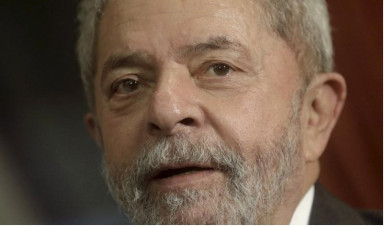SAO PAULO/BRASILIA, (Reuters) – Former Brazilian President Luiz Inacio Lula da Silva was briefly detained for questioning yesterday in a federal investigation of a vast corruption scheme, fanning a political crisis that threatens to topple his successor, President Dilma Rousseff.

The investigation threatens to tarnish the legacy of Brazil’s most powerful politician, whose humble roots and anti-poverty programmes made him a folk hero, by putting a legal spotlight on how his left-leaning Workers’ Party consolidated its position since rising to power 13 years ago.
Police picked up Lula at his home on the outskirts of Sao Paulo and released him after three hours of questioning. They said evidence suggested Lula had received illicit benefits from kickbacks at the oil company, Petrobras, in the form of payments and luxury real estate.
The evidence against the former president brought the graft investigation closer to his protege Rousseff. She is already fighting off impeachment for allegedly breaking budget rules, weakening her efforts to pull the economy out of recession.
Rousseff expressed her disagreement with the police taking her mentor into custody, saying it was “unnecessary” after his voluntary testimony. But she repeated her backing for institutions investigating corruption and said the probe must continue until those responsible were punished.
News of Lula’s brief detention sparked a rally in Brazilian assets as traders bet that the political upheaval could empower a more market-friendly coalition.
The real currency rose over 3 percent against the U.S. dollar before settling to a 1 percent gain. The Bovespa stock index rose 4 percent, led by a 10 percent surge for the state oil giant Petrobras, formally known as Petroleo Brasileiro SA.
“Ex-president Lula, besides being party leader, was the one ultimately responsible for the decision on who would be the directors at Petrobras and was one of the main beneficiaries of these crimes,” police said in a statement on his detention. “There is evidence that the crimes enriched him and financed electoral campaigns and the treasury of his political group.”
Lula was indignant, slamming investigators for “disrespecting democracy” and running what he called a media circus rather than a serious investigation.
He told supporters at Workers’ Party headquarters he had already answered the questions that police asked him on Friday and reiterated that he was not the owner of luxury real estate that investigators have suggested he received as bribes.
Rousseff has also repeatedly denied any wrongdoing. Her labor minister, Miguel Rossetto, said in a public statement that the detention was “a clear attack on what Lula represents.”
“This is not justice, this is violence,” he said.
Underscoring the deep political passions surrounding the former president, TV images from the street outside Lula’s home on Friday showed his supporters clad in red shirts exchanging chants, insults and even blows with opponents.
Dozens of police arrived to break up the altercations, clearing the street by force. Pro-Lula protesters also gathered in a noisy protest outside federal police offices at a Sao Paulo airport where he was taken for questioning.
As the founder and figurehead of his party, Lula’s image has been central to huge street protests over the past year, both for and against Rousseff’s impeachment, and powerful unions have marched repeatedly in his name.
A presidential aide who had not been authorized to comment publicly called the accusations against Lula a “turning point” in a long-simmering political crisis.
“This breaks with standard procedure. If they do not quickly present concrete proof against Lula, there is going to be violence in the streets. It could be a real war,” the aide said.
Lula, 70, was a model for a wave of leftist presidents in Latin America as his government coupled healthy economic growth with popular social programs that lifted more than 30 million people out of poverty during his presidency from 2003 to 2010.
Yet investigators say much of the corruption at Petrobras happened during that period. Yesterday, they called him and Rousseff the chief political beneficiaries of a scheme to fund Worker’s Party campaigns with bribe money.






